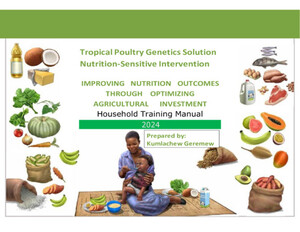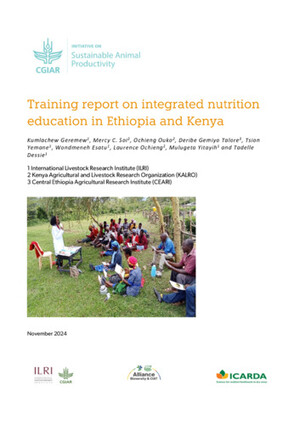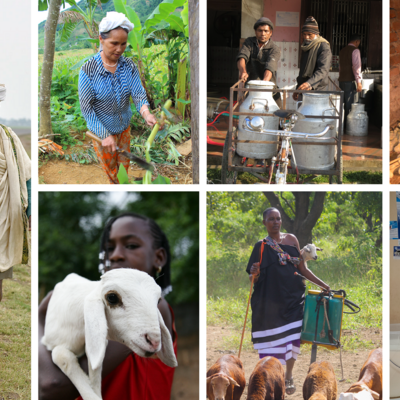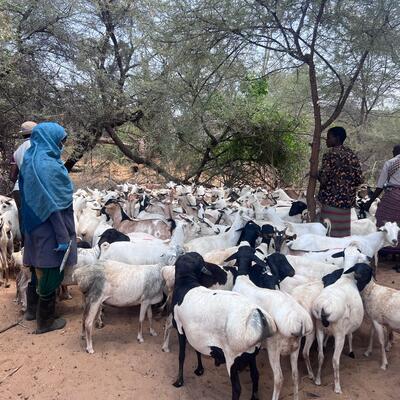

Essential foods, missed opportunities: What prevents Ethiopian children from eating nutritious animal-source foods?
Animal-sourced foods are rich in essential nutrients, including protein and vitamins, which are vital for children's growth, brain development and overall health. Ensuring that children receive these nutritious foods is not just a choice; it is a responsibility that underpins their optimal growth and development. It’s crucial for all stakeholders involved in food security and nutrition to recognize the importance of these foods.
Unfortunately, children in resource-constrained settings often face significant barriers to access of animal-sourced foods. For example, in recent years low-income regions including Ethiopia have experienced a substantial rise in the cost of living. In light of these challenges, researchers from the International Livestock Research Institute (ILRI), the Global Academy of Agriculture and Food Systems, and the International Food Policy Research Institute (IFPRI) collaborated on a study to examine how the factors impacting animal-source food security and affordability. The aim of the study was to provide evidence-based insights for consumers, producers, and policymakers to tackle the critical issue of animal-sourced food consumption among children in vulnerable populations.
How was the study conducted?
Researchers conducted field interviews in the urban, peri-urban, and rural villages of Bahir Dar and Debre Birhan towns in the Amhara region of Ethiopia, alongside an analysis of the latest available data from the Ethiopian Demographic and Health Survey which provided a more robust context for the research. They engaged a diverse range of participants, including mothers, caregivers, community leaders, and health experts.
This combination of quantitative data and qualitative narratives not only revealed the challenges families face but also highlighted the cultural dynamics influencing dietary choices.
The key findings were:
Low consumption of animal-sourced foods among children
Despite a large and diverse livestock population in the region, fewer than one in eight children (13.2%) consumed at least one item from animal-sourced foods, primarily dairy and eggs. Alarmingly, nutrient-dense flesh foods such as beef, organ meat, and seafood were rarely included in children's diets.
Five major drivers of low consumption
Factors driving the low consumption of animal-sourced foods could be categorised under:
- production
- knowledge and attitude
- economic (price) factors
- technology
- policy and strategy
Affordability and awareness emerged as the most pressing and immediate barriers to animal-sourced food consumption by children. Additionally, confounding factors such as geographic location and household wealth significantly influenced dietary choices, with families possessing greater resources and education more likely to include animal-sourced foods in their diets. Production and policy were considered underlying factors, while technology served as an intermediate factor.
Seasonal availability of animal-sourced foods is a challenge
Access to animal-sourced foods is significantly hampered by the seasonal availability of fresh foods, which varies throughout the year. This fluctuation results in periods when families cannot secure adequate animal-sourced foods, thereby exacerbating nutritional gaps in children’s diets during critical growth phases.
Negative attitudes to feeding eggs
Many caregivers avoid feeding eggs to infants due to concerns about allergies and digestive issues, often rooted in cultural beliefs and lack of awareness. This cautious approach further limits dietary options for young children, preventing them from receiving essential nutrients crucial for their development and overall health.
Feasibility challenges
Feeding children animal-sourced foods, particularly meat, presents considerable challenges, including economic constraints and limited availability. A majority of respondents indicated that providing meat to children was often unfeasible, highlighting the urgent need for targeted interventions to address these barriers and ensure that families have access to necessary nutritional resources.
Other miscellaneous drivers
Additional factors, such as low productivity of local livestock, insufficient support from health professionals, and time constraints faced by caregivers further complicate the situation.
Key takeaway messages
In conclusion, the consumption of animal-sourced foods among children in the Amhara region is alarmingly low and poses significant risks to children's growth and overall health. The study identified low awareness among caregivers and the unaffordability of these foods as primary barriers, compounded by socioeconomic factors and seasonal availability. Addressing these multifaceted barriers is essential for improving the nutritional status of children in Northern Ethiopia.
To tackle these challenges, researchers recommend targeted behavioural and sociocultural interventions. Educational programs should focus on raising caregiver awareness about the nutritional benefits of animal-sourced foods and strategies to improve their affordability. Additionally, community initiatives can enhance the availability of diverse animal-sourced foods. By equipping caregivers with knowledge and resources, the researchers believe we can significantly improve children's dietary habits and health outcomes in the region.
You may also like
Related Publications

Adapting the Women's Empowerment in Nutrition Index: Lessons from Kenya
- Lentz, E.
- Jensen, Nathaniel D.
- Lepariyo, Watson
- Narayanan, S.
- Bageant, E.

Social behaviour change communication in nutrition and social norms results in improved community health systems, and household attitudes, and behavior
- Ahmed, Hardi
- Ahumuza, Ronnie
- Molina, Teresa
- Ngalombi, Sarah
- Ouma, Emily A.

Smallholder farmers in Kenya applied integrated nutrition education promoted by SAPLING
- Soi, Mercy C.
- Ouko, Ochieng
- Geremew, Kumlachew
- Yemane, Tsion
- Esatu, Wondmeneh
- Ochieng, Laurence
- Yitayih, Mulugeta
- Dessie, Tadelle

Training report on integrated nutrition education in Ethiopia and Kenya
- Geremew, Kumlachew
- Soi, M.C.
- Ouko, O.
- Talore, D.G.
- Yemane, Tsion
- Esatu, Wondmeneh
- Ochieng, L.
- Yitayih, Mulugeta
- Dessie, Tadelle















